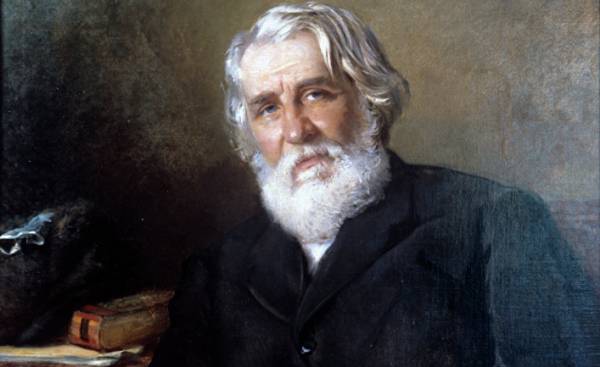In January 2012, the year I taught at his home institution of higher education — Middlebury College (one of the most prestigious private universities in the United States, located in Vermont — approx. ed.). The scope for the training was interesting — the intersection of Russian literature and politics. I had 18 students, mostly freshmen and sophomores. We met four days a week for lessons of two hours duration, in the building, which they call “the castle”. This building housed the faculty of the French language and it looked like a French Chateau in miniature — hence the nickname. We read three novels: “Fathers and sons” by Ivan Turgenev, “Crime and punishment” by Fyodor Dostoevsky and “What to do” by Nikolai Chernyshevsky. The aim of the course was to continue the controversy, who are the characters in the novel, extrapolating them to the real events in Russia in the 1860-ies — the time when all these works were written.
I focused on the period of the 1860s, because that’s when the ship of history has embarked on a dangerous course. The same course that led the country after fifty years to a disaster that few could predict. Fifty years before the revolution, few could have foreseen its consequences: civil war, tyranny, hunger, mass deprivation of liberty, and then the mass executions.
Our first lesson, I started with the comment that I was very suspicious of the attempts of historical analysis, which reduce the Russian revolution to a “turning point” in time in the historical process. Actually the whole pre-revolutionary period, beginning with the abolition of serfdom and then subsequent events (culminating in the emergence of the “catechism of the revolutionist” by Sergei Nechaev) — this entire period, and became a series of moments, priblizava revolution. During this period the language of universal negation (nihilism), as well as accompanying the denial of death has gained universal popularity in Russia. And then there is a real possibility of the collapse of the old order.
At that time, in 2012-m to year, this whole subject seemed so academic, far from real life. Something abstract. Remote at a safe distance. This feeling was intensified by the atmosphere of Middlebury College — old respectable University of New England. Old buildings built of limestone by the rules of the nineteenth century, mown lawns, fields, snow, and trees, as well as impervious to the noise of the city the silence — all of it made on a scientific footing. Discussion in the mess concerned trudnoperevarimoy passages in Ovid, and was the debate on the topic, which is better the fourth to gain strength before the last year of training in Chengdu, China or the Galapagos Islands. College during the winter semester, it seemed, moved on to some monastic rhythms — as monks, we seemed to be busy doing something at once, and very deep, and having no importance in real life. So this really is the solution that gives the final shape of our everyday life are taken in distant big cities. But the ideas on which to base these decisions, such ideas are born, tested, spread and take its final form in the heated debate on the campus of campuses.
Now, after several years, I understand the reasons for my decision to start teaching was not purely academic. In 2012 I was just about to celebrate 40-year anniversary of marriage, then eating twice-daily rite of passage, which in today’s world look more obliquely and ironically. So my return to Middlebury was due to my desire to look again at my student’s past, to visit once more in his own skin — before you say her last goodbye.
But in my desire to turn to seeking and restless youth and another motive is much more frightening, though unclear at the moment. The metaphysical Gulf between Russia of the nineteenth century and America of the twenty-first century suddenly began to rapidly shrink. The Parallels between the current us and them then suddenly be not just sharp — they become inevitable. All the same the revolutionary catastrophe loomed ahead of us. Of course we can reassure ourselves repeating the obvious truth: the United States today is not tsarist Russia. Our present — is not a Russian past. History in General does not exactly repeat. And still… what can’t we suddenly slip into savagery? To return to the original natural status, which we thought we got out of this nightmare forever. This is the lesson of the twentieth century: you can’t.
The common features of today’s America and pre-revolutionary Russia are so numerous that we can say about them as about the biblical demons: “their Name is Legion.” The coarsening of culture; economic woes in the form of uncertainty about the future, the threat of falling into poverty; political congestion associated with the inability for some young and active people to take part in government, and more.
But the most important and dangerous parallel is the ease with which we pronounce this word “revolution” against himself, how lightly we condemn it (take at least Bernie Sanders with his romanticizing of the “political revolution”). Add here still some common features of Russia of the nineteenth century and the United States of the twenty-first century: mutual anger, political polarization and anti-Semitism.
It is very important and the emergence of new actors, “people of a new type” that we are not so different from the old Russian type. Take, for example, Yevgeny Bazarov. For Bazarov, the generation of “children” in Turgenev’s “Fathers and sons” all Russia — solid rot, and anyone who does not notice, is either a fool, or footman-trimmer. And the only solution is to erase everything to the ground. And this thinking has its own logic, their own motives. Russia was ruled by its past enchanted monarchy. The noble class participated in perpetuating a monstrous all the parameters of the inequality. The Orthodox Church was seen to many as an ally of the ruling class. But the ruling classes slipped to liberalization with a slow slipping from the everlasting mountains of glacier.
As we have now, it was easy to rush to conclusions, saying that Russia will not be able to be different, and therefore the only way to free her from the shackles of the middle ages is to start from the beginning, destroying everything created until now. Bazarov, a doctor by profession, whose empirical view of things leads him to nihilism, is sure that Russia needs to start that from scratch. Everything about him — his sarcasm, his cruelty, lack of compassion for people — all designed to convey the contempt, the desire to destroy, to sweep away completely all the old. He openly indelicate in relation to the generation of “fathers” in the novel to Nikolai Petrovich, and to his own father Vasily Ivanovich. The reason is simply that they are old. They are fathers. They came to us, and therefore they are by definition less developed and viable. For Bazarov, as our American revolutionaries, all who do not see the world the way he (and most people) are all obstacles in the way, or just enemies. Such disagree — actually, not the people. Bazarov denies them the right to be fully human beings.
But is it really so different from the Bazaars of today’s protesters, subversives of the statues? All these “guys barely twenty”, which spread war and revolution in newsroom leading Newspapers? All of these representatives of a “culture of cancellations”, a super-progressives? And in fact, this kind of people — a completely anti-social elements, sociopaths. Today they took on the role of the police, of eradicating wrong views in social networks, they are ready to chop off our knowledge of history, or just rewrite it again — and all this, of course, for a glorious future. Like Bazarov, they proceed from the fact that their homeland (in Bazarov it was Russia that for these guys — USA) is a hopelessly backward country. For them a state of their own — like a cancer, it not just pulls the world back, it is still full of hatred and in General is a hindrance to reasonable thinking people all over the world. Like the Souks, our nihilists all very rude sarcasm (or at best with a skeptical uspeshnoi). However, as the Bazaars, their anger there’s a logical reason: in addition to the radicals just fools, we can see in the ranks of the protesters a lot of normal Americans, warring against the barbaric vestiges of racial hierarchy, built about four centuries ago. Traces of this hierarchy are felt till now. In such a situation it is a reasonable question: “And when we finally overcome the past?”
 © RIA Novosti, Vladimir Malyshev | to Go fotobaikeram Ivan Turgenev
© RIA Novosti, Vladimir Malyshev | to Go fotobaikeram Ivan Turgenev
The only important and obvious distinction between “novel” a Russian nihilist Bazarov and his very real today’s American counterpart is the “lens” through which they look at the history. Bazarovskoe radicalism, clearly taking their origin from theories like Marxism, actually reduced to economic determinism. That is, the belief that the whole history of humanity can be reduced to the fact that the owners of the means of production exploit those who these same funds to own did not happen. Today’s radical economic determinism with his class theory was abandoned somewhere in the closet of history. Instead, they took a new determinism, based on the feelings of depression due to your race or sex (they call it gender). All of us supposedly determined by these aspects of our personality, everything can be explained on the basis of this identitylogo determinism — everything is cause and effect of our development, our political and economic prosperity or extinction, even the question of whether we are moral or immoral people. This conviction is, it seems, even the “new York times” “1619”. This Project 1619 American history put on the Procrustean bed of race relations.
There are many reasons why Marxist economic determinism was out of fashion. The rise of capitalism in China and India, the collapse of the Soviet Union, the remarkable growth of the capitalist economy of the United States in 1980-e and 1990-e years. In General, you can even specify on the Internet and the growing interconnectedness of the world economy, plus a sharp reduction in extreme forms of poverty across the planet. N here’s the awful part: the rejection of Marxism here in fact is not important. Marxism is the basis of the new basarabeni. Marxist or non-Marxist, azarovschina current and radicalism unified in one thing: they are full of the spirit of evil, they are anti-intellectual and they reduce the need for understanding by a person of their own destiny to an absolute, truly extreme minimum. Today’s bazaars and its American counterpart were both obsessed with totalitarian faith. They are convinced of the infallibility of your so-called “high case” and can’t get out of the devoid of Windows in the world echo chamber, which was created for them the authors of their ideologies, and where they don’t hear other voices except their own. Bazarov and his double can’t get out of there for one reason: they just don’t know they are prisoners.
The character of Dostoevsky named Raskolnikov knows that he is a prisoner, but he misunderstands the nature of freedom. He believes that the only reason he can’t become what it could do to his ability, is money, or rather the lack of them. This conviction leads him down a slippery slope conclusions, in which he convinces himself. If I have money, I will finish the University studies. If I graduate from University I will become important for the world thinker. Well, if I become important for the peace thinker, the peace did not feel anything except a sense of gratitude for those sins I may have committed to complete the training.
This slippery slope eventually leads Raskolnikov to murder the old woman prozentsatz and her half-sister.
According to Dostoevsky, Raskolnikov to overcome the holding in captivity of difficulty stopping not really poverty, but a lack of faith, his infidelity. Raskolnikov spoiled the ungodly, overmany materialism, coming from the West like pandemic and suddenly engulfed the educated classes of St. Petersburg. Raskolnikov’s soul, as the soul of Russia, is suddenly shattered (this is the symbolism contained in the name of Raskolnikov, the Russian word raskol). And apparently Dissenters corresponds to this division: it forked, hungry, not combed and not washed, he wanders the town in a sort of semi-permanent oblivion. In this state, it is a metaphor for the country that never knows what she is destined to become.
In Raskolnikova in some sense, too, lurks the image of the American twenty — first century- but not bazarovskoe revolutionary, and his opponent — the ultra-right neo-Nazi, steeped in mythology trompowsky “fantasy land” whose inhabitants never to blame. The Parallels between the novel and Russian speakers especially in the genre of non-fiction to the average American tranistor cannot fail to impress. Both seem that they live in a crazy world, where everything is moved and where it went. Both imagine that to save this world that commit acts of terrible violence. Both subconsciously not quite sure of this violence: Raskolnikov pole heads arguing with itself about the planned murder before it has to send the old lady to the hereafter. And our white American nationalist before committing the planned crime for a long time advertise it in social networks. Both, we believe, could have saved a woman’s love, if they met her before it was too late: the Dissenters — this is the first Intel in modern literature (incely subculture of men who find themselves deprived of sex in modern society, and therefore indulging in hatred for women and sexually successful people, in the US, they declared a “hate group” and persecuted — approx. ed.). Interestingly, the Dissenters, and the white right-wing in the United States today are simply corroded by hatred to themselves. They hate being alienated from society, and they blame themselves for this exclusion.
What is most interesting: and Dissenters, and it appeared through the ages us double — both of them are indicators of tearing our society forces. Their crimes are committed out of desperation, and therefore often meaningless. Their goal is unattainable. Their outbursts of violence — is not part of some cunning, and let the cruel plan for the achievement of domination of the white race in the world. No, it’s just death throes of a country that is falling apart, but gradually — as in time-lapse filming.
It seems that we have still time to correct the course of our ship. The best evidence for this is the lack in America today at least one woman, similar to Vera Pavlovna from Chernyshevsky. Vera is a character of the novel Chernyshevsky “What to do?” and it is a response to Chernyshevsky on the image of Bazarov. It destroys and it builds. She’s always building something around themselves is an independent life, sewing artel, the feminist movement. While Bazarov is seething with sarcasm and contempt, Vera nothing is not able to laugh — it is a serious and unstoppable in their plans. While Bazarov, as if a bulldozer destroys the past, it creates a future that you begin to dream about the past. The story Vera is in its own, strange way inspiring, at least it was designed to do — and some people Vera really inspired. Lenin called his political pamphlet of 1902, “What?” — the title of the novel. The great scholar of Dostoevsky, Joseph Frank praised the “What to do?” for what Roman has given Russian revolution, “emotional dynamics”, which eclipsed even the “Capital” of Marx in its impact. But here’s the thing: unlike Bazarov, who was recognizable to almost every thinking person in Russia in the mid nineteenth century, Vera — pure fantasy, its purpose is to create out of thin air example of revolutionary consciousness. It implements the author’s dream — there is an image of active, creative revolutionaries. He was far from the reality of a dream then, it remains a dream today — and let us pray he dreams and left.
Of course, any comparison or synthesis of historical periods — especially when we are talking about different cultures, and a comparison is involving and the characters of fiction — any such comparison is imperfect and approximate. There are obvious mismatches. But this should not stop us from being able to see the psychological match, because the forces affecting man in all the world are the same, universal. (Bazarov, as Schismatics, were such a great and enduring literary character because of his versatility.)
We should agree that in our current “discourse”, that is becoming rougher and sharper communication of Americans with each other, is a dangerous roll in the manner expressed these novel characters — a literary precursor of the Bolsheviks and Stalinists. All this type of people destroy the old civilizations, they tear down only to build a new world in our own image and likeness.
We all know how that ended. And those who have forgotten, or just too young or uneducated to have the opportunity to learn what the destruction of monuments turned in Russia — all of them we need to be reminded, again and again. Remember the fate of those who resisted. Everyone who was subjected to the Russian revolution question, he objected to any of its purposes and methods — all of these people was declared in the worst case, the soldiers from the camp of the enemy — with all the consequences. In the worst — they rejected as disabled persons thoughts, poor losers, about whose thinking has impeded progress. In the end, those and other “smoothed out”. In the end, it turned out, as now we have in the United States that there is only one method to prove that you are not the enemy and avoid the sweep. It is necessary to point out other, more dangerous enemies of progress. Whether these enemies are real villains or just a figment of your imagination. Only idiots in such cases, care about the truth. In those conditions it was necessary to survive, and not think about the truth. The truth was not simple anymore. The main thing was to keep your head down, and if I had bad — to level accusations at others. Blame, blame! Or as they say in the US, the best defense is a good offense, good defense is a strong accusation against someone else. As soon as repression intensified, always have “signal” active and active, to name more names, to expose all new and new “thought-crimes”. And so until then while the place of the country [the USSR then, USA now] will not remain bloodless and bessmyslennyi corpse with a population that, like, moved here from other places: so he’s got a few old roots and attachments.
When I think about what kind of people we become with all these #MeToo and #BLM, I think of old men, whom I managed to interview in Moscow, Minsk, Brest, Kiev, Tbilisi, Novosibirsk, Irkutsk, Khabarovsk, Vladivostok. They were mostly old Bolsheviks, who spent a year or two and 10-20 years in a concentration camp in the North or North-East of Russia. They sat usually in the 1940s or 1950s. Their wine was often so small that it generally was not a crime. Often they talked about the need to survive was starving and stole a loaf of bread. Or talked to the wrong person, or said something politically incorrect. AI you just accused, not bothering to search for evidence of something worse.
Most surprising in these old it was not even their suffering and how they talked about him. “It was tough, but it was necessary to do, Stalin was the right man in the right place in difficult times.” They clung to all that allowed them to retain their old beliefs. And that’s me they impressed by the inability to retreat from ideological dogma even when the dogma was clearly illogical. Even if it’s the lack of logic paid your own personal misfortune. And it’s the same reason why people from the movement “wouk” I do not agree with my idea of parallelism between the then Russia and the United States today. (Wouk, in English the word “sprang, the enlightened” — in contemporary American political slang refers to anyone associated with the radical antiracism, feminism, LGBT activism, and other movements for a new identity — approx. ed.)
People from the movement “wouk” convinced that he was right, and if you don’t agree with them — loudly and passionately — you run the risk of being rejected by them on the side of life. We have many years say many times that all of this — the voices of children and enthusiast fringe that after graduation they will throw their impossible, that the forces of the establishment will keep the radicals in line. But here’s the situation — look at the website Vice News. (The website video and audio reports, in direction close to the movement “wouk”, engaged in “exposing” the militias in the Donbass and the coverage of the protests against President Maduro in Venezuela — Prim. ed.). The website Vice News thinks we should blow up mount Rushmore, and Time magazine, fearing to be misunderstood by a new audience, offers a new take on American superheroes. Every white woman over forty — that is, all 50 million Americans in this group — is associated today with Karen (white, middle-aged woman, trapped in a “viral” video on the Internet due to their fright in front of the black man approached her in the Park — approx. ed.)
Self-righteous progressives laugh at the fears of the whites, grinning, shaking his head and saying something about “white fragility.” But in this situation, discern a faint shadow of fear. The old snobbery of the educated classes is faced with the pressure of the rebels. And yet — with the most radical rebels, who continue to chant, yell and growl. What do they growl? That everything they know and love — all of this is corruption, evil. All around is imbued with “bloody white”, and the only way forward is through getting rid of all of it. Standing next to a huge crowd of right-wing views — and it’s almost always an angry crowd and watching on TV or in real life, to vanish like the old statues of its parks and its squares. And this is the right crowd not only angry, but also scared. She feels that she just does not affect events in that country, about which they say that white it retains a kind of pervasive racial superiority. White majority does not know where he is in this situation to go and who to contact. Now white America is a headless mass. This is partly due to demographics: the confusion caused by the change in the racial situation, religion, and geography exerts its influence. There is another factor causing the weakness of the white minority: its leader is incompetent, a quack from politics, the man with the psychology of the fair barkers, whose buffoonery has broken many lives. Add here the new economy, changes in culture, in technology. The angry white majority it seems — and not ithout reason that his time is running out, it just trapped into a corner.
White resident comfortable suburbs with the Christian heritage as a religion, moderately conservative, family and mortgage what became of him? He saw himself the basis of postwar America, with its two cars, the younger abdomen, and tickets to the most fashion trends of the season, where is he now? He has not disappeared, disappeared, America — the same one that was here a few minutes ago. And this white resident of the white house in the suburbs suddenly feels that he has taken his past (monuments), and its future. He said that everything he has grown morally bankrupt. And soon his services are no longer needed — and who needs it in new situations, he is a “blue chip”? From these conversations, a white man slowly becomes irritable — so much so that the mere act of putting on protective face masks seem to him to surrender. He would prefer to die — but not “humiliated” by protecting the lives of their children and parents.
In this summer of our discontent it is worth remembering that die in the novel, Turgenev’s Bazarov. To his surprise, he suddenly falls in love with a beautiful widow, Anna Sergeyevna. Moreover he confesses his love for her. She rejects him and he, usually so strong and confident, coming home to his parental home in the village. His parents were in awe of meeting him, but they are concerned about — after all, our Yevgeny is so easy to irritate. The mother does not know how to ask about preferences regarding lunch — prepare soup or borsch? Father, retired military physician, happily accept actually pretty nasty barbs son about his provincial habits. Parents don’t want Bazarov went away. They would like to live a little together.
And suddenly — destiny: the farmer in the neighboring village becomes infected with typhus and died. Bazarov voluntarily conducts the autopsy and, during this operation, accidentally makes a cut with a knife — and also infected with typhus. Lying on his deathbed in the parental home, he sends for Anna Sergeyevna, and she comes. Shortly after this meeting, it dies. And we understand that Bazarov’s death was no accident: whatever he was talking about his invulnerability, and his heart was broken.
Bazaars can as much as necessary to pretend that it is radical that his romantic love will not understand — like other “bourgeois conventions”. He can say what the conversation, he leads with the Story that he — a man of History. In fact, it is this “Superman” is not. And the great hope that conveys to us through the centuries Turgenev, is that none of us — not Superman. At least most of us are people of flesh and blood, with romantic love and other things. And that’s good.
Today it is more important than ever to read, ponder about Turgenev, to return to him. I especially hope that we will be able to reverse the destructive processes that are already running, although I am far from hopeless. I believe in one thing: while there are thinking people, and there is a place to share ideas — while all this is, is a reason for cautious optimism. It is the willingness to keep the exchange of ideas — with their inevitable contradictory, conflicting ideologies, etc. — it allows us to keep hope. Because it was under the influence of this exchange opens that microscopic otdelchik in our brain, which is responsible for our ability to doubt. This ability to doubt themselves, it’s suspected that “maybe I’m wrong” — this is the one thread that we can cling to be saved.







